Chester
Old Prison Yard, Shipgate St
19 Old Bank buildings, Foregate street
Corn Exchange
Thomas Street
Volunteer Street*
39 Pepper Street
Albion Street*
(* see comment below)
Old Prison Yard, Shipgate St
HQ,1,2 Cheshire Batteries (1st & 2nd) Royal Field Artillery, Ammunition Column Cheshire Bde
19 Old Bank buildings
Foregate street HQ, ds B Cheshire (Earl of Chester's) Yeomanry Territorial Force
Corn Exchange
Head quarters, B Squadron (Kelly 1896)
Thomas Street HQ
A,B Sect Welsh Border Mounted Brigade Famb RAMC (in 1909 listed as St Michaels hall, Volunteer st)
Volunteer Street
Territorial Force 5th (Earl of Chester's) Battalion Cheshire Regiment; head quarters, the Drill hall, Volunteer st. (Kelly 1914) HQ,B,E 5 Cheshire 39 Pepper street Artillery Volunteers 1st Cheshire & Carnarvonshire (Southern division) Royal Artillery; head quarters
39 Pepper street;
position battery, No. 2 Company (Kelly 1896)
Albion Street
HQ A-E 2 VB Cheshire (Kelly 1896) The Volunteer Drill Hall was situated in the centre of Chester, where Volunteer street meets Albion street. These streets were to front and rear; Albion street is to the side and it faced down Volunteer Street. *Its location is described variously at each location, often within the same directory.
In the south-east of the intramural area a small group of new streets was built on the former gardens of the Albion Hotel: Albion Place, Albion Street, and Volunteer Street were laid out in the mid 1860s and Steele Street was added in the 1880s, partly on the site of Roberts' and Wilkinson's Courts. All four streets had terraced working-class housing. The centrepiece of the area was the new Volunteer Drill Hall, erected by public subscription in 1869 at a cost of £2,500. Built of red sandstone in an 'Edwardian castellated' style, it was for the use of the Chester Artillery and Rifle Volunteers. An extension of the building through to Duke Street in the 1900s resulted in the demolition of almshouses and two courts. Only the front elevation survived in 2000.
A description of Chester, 1874, states: 'The DRILL HALL is entered from Pepper street, and contains a lofty and spacious room, 100 feet long and 60 feet wide, lighted from the roof; the floor is concrete, which is well suited for the purpose of drill. It has a castellated front, with tower on the left side, through which is the main entrance, sufficiently wide to admit the Volunteers in full marching order, four abreast. The tower contains apartments for the armourer, and on the basement a small powder magazine and the armoury, in which are 770 stand of arms. A Reading Room, Committee Room, and other offices, and Orchestra overlook the large hall, which is convenient for banquets, concerts, &c. Messrs. Kelly and Edwards were the architects, and the late Mr. Robert Bellis the builder. The cost was about £2,000.'
Kelly, 1914, describes the above building being in 'Albion st, erected 1869 at a cost of about £2,500; it is a building of stone with embattled front and a tower.' 'It was refloored in 1891 with wood at a cost of about £400.' And also has 'a dwelling house for the hall keeper.' But Kelly then lists 'head quarters, The Drill hall, Volunteer st.
' There is no mention of a military unit based there by 1914, but Kelly 1914 lists 'James Joseph Rahill, hall keeper.
' The facade remains (2005). It is the curious turreted building you can see at the end of Albion Street. The conversion has been re-named Albion Mews.
A planning application exists for the 'Former Drill Hall, Albion Street, Chester: Retention of façade with formation of new residential development.
CHESTER CITY (IM) SJ4066SE ALBION STREET 595-1/4/26 (South side) Albion Mews GV II Drill hall. 1868. By James Harrison, built from public subscriptions. Converted to flats mid C20. Stone-dressed brick, largely painted, with grey slate roof. 2 storeys plus added recessed Mansard-roofed attic; 3 storey gatehouse tower at east end has red sandstone archway with moulded arrises to jambs and double-chamfered voussoirs; battered buttresses; a 2m brick plinth to west wing, now rendered; a rectangular loop and 3 stone cross-windows to the first storey. 3 recessed panels with blank shields, a stone cross-window with pointed upper lights and a quatrefoil in a recessed stone circlet above the archway. The second storey has a 1-light transomed stone window and 3 cross-windows with shouldered arch, pointed arch and shouldered arch to upper lights. The crenellated parapet to the west wing has a small square turret at the west corner with machicolated crenels. The third storey of the gatehouse has a 2-light mullioned window, a crenellated parapet and a corner turret with machicolated crenels. Gatehouse archway has double cross-boarded doors. The east side is English garden wall bond. INTERIOR rebuilt.
Old Prison Yard, Shipgate St
19 Old Bank buildings, Foregate street
Corn Exchange
Thomas Street
Volunteer Street*
39 Pepper Street
Albion Street*
(* see comment below)
Old Prison Yard, Shipgate St
HQ,1,2 Cheshire Batteries (1st & 2nd) Royal Field Artillery, Ammunition Column Cheshire Bde
19 Old Bank buildings
Foregate street HQ, ds B Cheshire (Earl of Chester's) Yeomanry Territorial Force
Corn Exchange
Head quarters, B Squadron (Kelly 1896)
Thomas Street HQ
A,B Sect Welsh Border Mounted Brigade Famb RAMC (in 1909 listed as St Michaels hall, Volunteer st)
Volunteer Street
Territorial Force 5th (Earl of Chester's) Battalion Cheshire Regiment; head quarters, the Drill hall, Volunteer st. (Kelly 1914) HQ,B,E 5 Cheshire 39 Pepper street Artillery Volunteers 1st Cheshire & Carnarvonshire (Southern division) Royal Artillery; head quarters
39 Pepper street;
position battery, No. 2 Company (Kelly 1896)
Albion Street
HQ A-E 2 VB Cheshire (Kelly 1896) The Volunteer Drill Hall was situated in the centre of Chester, where Volunteer street meets Albion street. These streets were to front and rear; Albion street is to the side and it faced down Volunteer Street. *Its location is described variously at each location, often within the same directory.
In the south-east of the intramural area a small group of new streets was built on the former gardens of the Albion Hotel: Albion Place, Albion Street, and Volunteer Street were laid out in the mid 1860s and Steele Street was added in the 1880s, partly on the site of Roberts' and Wilkinson's Courts. All four streets had terraced working-class housing. The centrepiece of the area was the new Volunteer Drill Hall, erected by public subscription in 1869 at a cost of £2,500. Built of red sandstone in an 'Edwardian castellated' style, it was for the use of the Chester Artillery and Rifle Volunteers. An extension of the building through to Duke Street in the 1900s resulted in the demolition of almshouses and two courts. Only the front elevation survived in 2000.
A description of Chester, 1874, states: 'The DRILL HALL is entered from Pepper street, and contains a lofty and spacious room, 100 feet long and 60 feet wide, lighted from the roof; the floor is concrete, which is well suited for the purpose of drill. It has a castellated front, with tower on the left side, through which is the main entrance, sufficiently wide to admit the Volunteers in full marching order, four abreast. The tower contains apartments for the armourer, and on the basement a small powder magazine and the armoury, in which are 770 stand of arms. A Reading Room, Committee Room, and other offices, and Orchestra overlook the large hall, which is convenient for banquets, concerts, &c. Messrs. Kelly and Edwards were the architects, and the late Mr. Robert Bellis the builder. The cost was about £2,000.'
Kelly, 1914, describes the above building being in 'Albion st, erected 1869 at a cost of about £2,500; it is a building of stone with embattled front and a tower.' 'It was refloored in 1891 with wood at a cost of about £400.' And also has 'a dwelling house for the hall keeper.' But Kelly then lists 'head quarters, The Drill hall, Volunteer st.
' There is no mention of a military unit based there by 1914, but Kelly 1914 lists 'James Joseph Rahill, hall keeper.
' The facade remains (2005). It is the curious turreted building you can see at the end of Albion Street. The conversion has been re-named Albion Mews.
A planning application exists for the 'Former Drill Hall, Albion Street, Chester: Retention of façade with formation of new residential development.
CHESTER CITY (IM) SJ4066SE ALBION STREET 595-1/4/26 (South side) Albion Mews GV II Drill hall. 1868. By James Harrison, built from public subscriptions. Converted to flats mid C20. Stone-dressed brick, largely painted, with grey slate roof. 2 storeys plus added recessed Mansard-roofed attic; 3 storey gatehouse tower at east end has red sandstone archway with moulded arrises to jambs and double-chamfered voussoirs; battered buttresses; a 2m brick plinth to west wing, now rendered; a rectangular loop and 3 stone cross-windows to the first storey. 3 recessed panels with blank shields, a stone cross-window with pointed upper lights and a quatrefoil in a recessed stone circlet above the archway. The second storey has a 1-light transomed stone window and 3 cross-windows with shouldered arch, pointed arch and shouldered arch to upper lights. The crenellated parapet to the west wing has a small square turret at the west corner with machicolated crenels. The third storey of the gatehouse has a 2-light mullioned window, a crenellated parapet and a corner turret with machicolated crenels. Gatehouse archway has double cross-boarded doors. The east side is English garden wall bond. INTERIOR rebuilt.
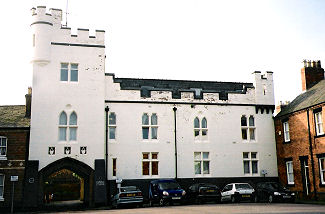
View from Albion Street
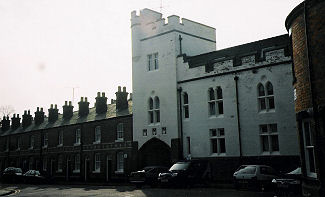
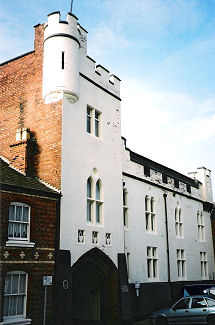
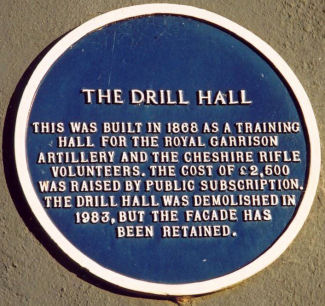
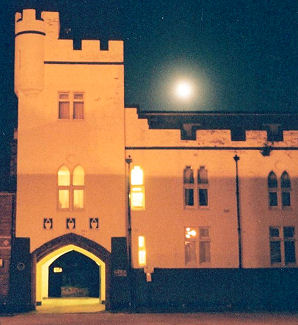 OptionalPhoto
OptionalPhoto© All material is copyright - refer to the
Terms of Use
the first attempt at content
Introduction
About
Anatomy
Drill
 Database
Database
 Memorabilia
Memorabilia
Resources Glossary
Saving Halls Participate Contact What's New? Terms of Use
Drill
 Database
Database Memorabilia
MemorabiliaResources Glossary
Saving Halls Participate Contact What's New? Terms of Use
The Drill Hall Project - Charting a neglected legacy